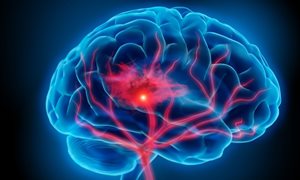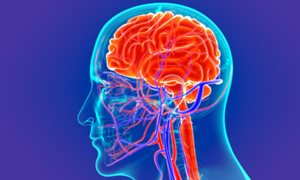
Not treating high blood pressure in the elderly and people with dementia can lead to more heart and brain infarctions. That is the conclusion of clinical geriatrician Jurgen Claassen. Together with colleagues, he wrote a review article on the mechanism of brain blood flow that challenges these and other incorrect assumptions.
About 20 percent of the heart's total output is needed for the brain to function and to maintain our consciousness. '20 percent is a relatively large amount of blood for such a small organ,' says Jurgen Claassen, a clinical geriatrician at Radboudumc. He conducts research into the blood flow to the brain in the elderly. 'As a result, things quickly go wrong when blood pressure drops: you are less alert, you fall and eventually lose consciousness.'
While blood pressure in the body is anything but stable. For example, it drops when you get up, and it can fluctuate under the influence of medication. To cope with these fluctuations, the brain regulates blood flow with a process called autoregulation. The goal is to keep the cerebral blood flow as constant as possible. 'It's a kind of spring system that absorbs the blows,' says Claassen. 'That way we don't faint every time we stand up.'
Dangerous assumptions
Claassen has noticed that autoregulation is an understudy in medicine. Most doctors still don't really understand how autoregulation works,' says Claassen. 'They know it exists, but have never gotten any further than that one chapter in the textbook.' So he and colleagues wrote a major review article on the current state of affairs, which was recently published in the journal Physiological Reviews.
There was a great need for such a recent article: the last review article in the field of autoregulation was from 1959. That knowledge gap is the cause of persistent misunderstandings in medicine, which Claassen hopes to combat with the article. One of these is the idea that the system of autoregulation starts to work less well as age advances. 'The idea has arisen that older people need higher blood pressure in the brain to maintain blood supply and consciousness,' says Claassen. 'This sounds harmless, but many doctors have concluded from this that they should just stop treating high blood pressure in the elderly. The result is that for decades older people have been walking around with dangerously high blood pressure, who were much more likely to die from a heart or brain infarction.'
Another misconception is the assumption that in dementia the autoregulation in the brain is disturbed, resulting in brain damage. 'It sounds logical: with dementia you already have a damaged brain, and the tissue would be more sensitive to oxygen deprivation,' says Claassen. 'In addition, in people with dementia you see more risk of blood pressure instability and vascular abnormalities. The idea has arisen that you should therefore offer those people higher blood pressure to compensate.'
Distorted view
Those dangerous assumptions are based on the fact that it is difficult - not only in people with dementia - to study autoregulation, says Claassen. 'This has only been possible since the 1960s with complicated techniques, and only when people remained lying down. That gave an incomplete picture, and explains why little good research has been done.' Nowadays, researchers have a better picture of the effect of autoregulation on blood pressure in the brain thanks to a combination of different techniques.
'By now, many small studies have been done on autoregulation,' says Claassen. 'If we put those together, we count enough subjects to conclude that there is no age-related change in autoregulation.' Nor does the fly in the face of dementia. 'There are serious consequences to keeping blood pressure high in the brain, especially in these people with dementia, who are already prone to vascular damage.'
Evidence in hand
Claassen argues for a different treatment of high blood pressure in the elderly, with more knowledge of autoregulation in mind. 'Even if it's difficult: we should keep trying to measure as old as possible patients with high blood pressure, so that we see in the real world that lowering blood pressure does not lead to reduced cerebral blood flow.'
The same goes for people with dementia, says Claassen. 'Again, if you don't treat these people in case of high blood pressure, you run the risk of it going in exactly the wrong direction. But evidence for that is lacking until we've investigated it. We need to start looking at the process of autoregulation more with the evidence in hand.'
Publication
Regulation of Cerebral Blood Flow in Humans: Physiology and Clinical Implications of Autoregulation - Jurgen AHR Claassen, Dick HJ Thijssen, Ronney B. Panerai and Frank M. Faraci. Published online ahead of printing on 26 March 2021.
-
Want to know more about these subjects? Click on the buttons below for more news.
Related news items
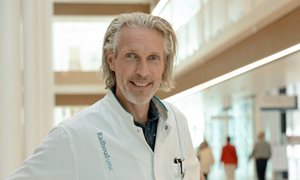
NWO Stevin Prize for expert on Parkinson’s disease Bas Bloem Major scientific prize for societal impact on research into Parkinson's disease
17 June 2022 Neurologist Bas Bloem of Radboudumc receives this year’s Stevin Prize of the Dutch Research Council (NWO). The Stevin Award is the highest distinction in science for a researcher in the Netherlands who has achieved particular success in the area of knowledge utilization for society. go to page
The future of laboratory animal research More attention to living conditions of laboratory animals
16 May 2022 On May 9, a meeting took place at the Radboudumc as a result of the launch of the Dutch Transparency Agreement on Animal Testing. The Radboudumc is one of the twenty signatories and has thus committed itself to openly and transparently communicate its vision and policy with regard to animal testing. go to page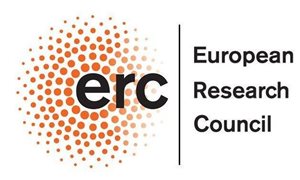
European grants for groundbreaking Radboudumc research Professors Roshan Cools and Peter Friedl receive ERC Advanced Grant
26 April 2022The European Research Council (ERC) is awarding grants to Roshan Cools and Peter Friedl, both professors at Radboudumc. While Cools will investigate how brains control behaviour in (stressful) situations, Friedl will work on developing a new cancer therapy.
go to page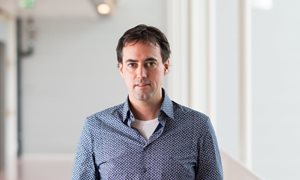
Erno Hermans appointed professor of Cognitive Affective Neuroscience
13 April 2022Hermans unravels the effects of stress on the brain, and uses that knowledge to develop preventive training programs that increase resilience.
go to page